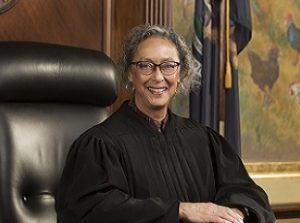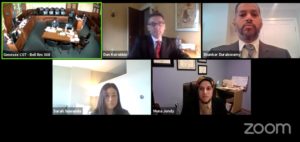By Tom Travis
Voters’ rights and prospects for proper processing of absentee ballot applications and ballots received a shot in the arm Thursday from Judge Celeste Bell of the 7th Circuit Court.
Bell ruled in favor of a lawsuit by the American Civil Liberties Union (ACLU) ordering the Flint City Clerk to comply with several terms including the Clerk’s office increasing open hours and days.
In addition the judge ordered the City Clerk to present a daily report of absentee ballot applications processed to the court.
Thursday’s ruling is a response to a complaint, Barkey et. al. v. Brown et al., filed July 16, by the ACLU and five Flint residents against City Clerk Inez Brown. The ACLU and the five other plaintiffs requested a writ of mandamus against Brown.
A writ of mandamus is a legal term referring to a court ordering that a governmental official carry out their duties and obligations in the interest of the public. The five Flint voters who joined in the case as plaintiffs with the ACLU are Brian Barkey, Doris Barkey, Quincy Murphy, Nayyirah Shariff and Maryum Rasool. Cooperating attorneys for the ACLU were Flint lawyers Alec Gibbs and Muna Jondy.

7th Circuit Court Judge Celeste Bell. (Photo from Genesee County Court website.)
Bell states in her order that the Court acknowledges there is “detrimental effect from the COVID-19 pandemic and the statewide shutdown” has had on the conduct of all governmental business. Bell also acknowledges the Genesee County ballots were delayed due to candidate challenges. The printing of the ballots was delayed as the Court ruled whether or not attorney Chris Christensen’s name could appear on the ballot.
Bell acknowledges these issues caused delay to the City Clerk’s meeting a statutory deadline of providing ballots during the 40 days prior to the election.
“Nonetheless,” Bell then stated, “A substantial delay has occurred in providing absent voter applications and ballots that cannot be explained or excused by the unfortunate circumstances affecting the voters and the City Clerk.”
Bell ordered that the voters of Flint are “in danger of irreparable harm through the loss of their constitutional absentee voting rights if the City Clerk fails to take immediate steps as required by this Order to comply with legal mandates regarding the issuance of absent voter ballots.”
In light of these reasons Judge Bell ordered that
–“all absent voter ballot applications currently in the possession of the Clerk, as well as any that are received through 5 PM on Saturday, July 25, will be processed within 72 hours from the signing of this order.
–“All absent voter ballot applications received after 5 pm Saturday, July 25 will be processed within 24 hours of receipt. Additionally the Judge Bell’s order states “with the exception of Sunday, July 26, the Clerk Office will be open to the public every day during regular business hours (7 am to 5 pm) for distribution and acceptance of absent voter ballot applications, distribution of absent voter ballots, and acceptance of completed absent voter ballots from the date of this order through Election Day, August 4, 2020.
–“Commencing Monday, July 27, the Clerk will provide to this Court and to OPPOSING COUNSEL a daily summary report containing the following information for the prior day: the total number of absent voter applications received; the total number of absent voter ballots issued; the total number of completed absent ballots received; and the total number of absent ballot applications rejected or delayed due to some deficiency. The report generated July 27 will reflect the statistics from the date of this order through Sunday, July 26.”
The order signed today by Bell calls for increased accountability through the present election cycle to insure improved efficiency of the processing of voters’ absentee applications and ballots.
City Attorney Angela Wheeler responded by email today, stating, “We appreciate that the court recognizes the challenges that all municipalities are facing and granted many of the City’s requests. The decision addresses the common interest of the City Clerk, the City and the ACLU to make sure that every vote is counted even in a pandemic.”
Wheeler says Facebook post promotes hysteria; Judge Bell says, “no, it’s about the clerk’s failures”
In Wednesday’s hearing, City Attorney Angela Wheeler presented a copy of a Facebook post written by Attorney Alec Gibbs on his personal Facebook page on July 4, 2020. The Facebook post stated facts surrounding the lack of ballot applications processed and the thousands of applications already received.
Wheeler asserted that this Facebook post promoted a “hysteria of disenfranchisement” in the community and on social media. She further stated that the hysteria “grew like wild fire.”
In her ruling on Thursday, Bell emphatically stated that this case is not about a Facebook post but about the failure of the City Clerk to carry out her duties.

7th Circuit Court Judge Celleste Bell’s courtroom broadcast on YouTube. Seen in the picture are a view of the courtroom with the Judge, ACLU Attorney Alec Gibbs and City Attorney Angela Wheeler. The other views on the screen are ACLU attorneys. (Screenshot from YouTube submitted by Tom Travis)
At the close of Wednesday’s hearing Bell inquired of Wheeler how many applications have been received. Wheeler responded, “I don’t have that number.” Bell said, “Well I’ve got to have that number.”
In the hearing Thursday morning Wheeler responded by stating that as of close of business on Wednesday there were 1,064 outstanding ballots to be processed, 98 ballot applications were received in the mail, 615 applications were going through the process of verification, 114 ballots were at the level of verification and were being scanned and stuffed for mailing, 211 were scanned and ready to go out in Wednesday’s mail, there was one ballot received from the new drop box placed in front of City Hall and there were 25 emailed applications received on Wednesday.
Wheeler noted on Wednesday that the City Clerk has been operating with seven full time employees, seven part time employees and two State of Michigan election workers to assist with the absentee applications and issuing of ballots.
Finally, in Thursday’s hearing ACLU Attorney Gibbs said there may not have been nefarious actions but there has been systematic failures by the City Clerk’s office. Gibbs added that “the time line presented establishes the City Clerk’s office had no intention to comply.
“No other municipality in Genesee County has had this problem of getting Absentee applications and ballots processed and issued,” he said. “We have seen a pervasive pattern of non-compliance. The only thing left for the Flint residents is for this court to issue relief.”
Judge Bell, along with all the courtrooms in the 7th District Court, are holding session by Zoom broadcast on YouTube. Bell heard arguments in a motion hearing beginning on Wednesday, July 22 until adjourned at 5 p.m.
The hearing reconvened at 9 a.m. on Thursday, July 23. Before moving to this judgeship, Bell was a city attorney in San Francisco and the former corporation counsel for Genesee County.
In full disclosure, Alec Gibbs is a board member for East Village Magazine.
EVM assistant editor and reporter, Tom Travis, can be reached at tomntravis@gmail.com.


You must be logged in to post a comment.